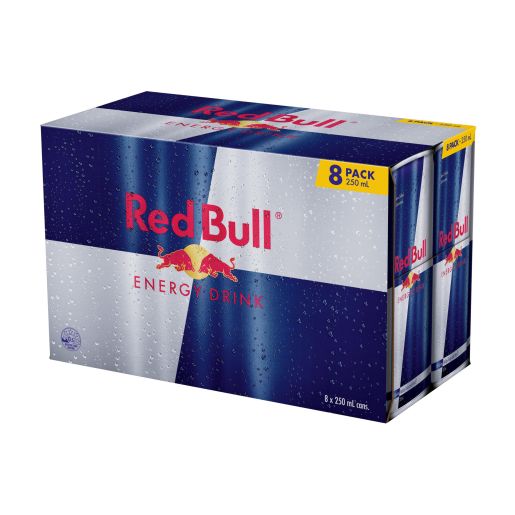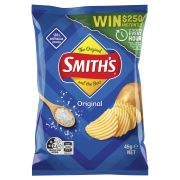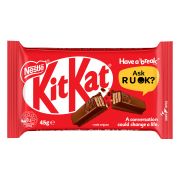
RED BULL
ENERGY DRINK 8X250M
Red Bull Energy Drink 8x250ml
Red Bull Energy Drink - Wings when you need them.
RED BULL GIVES YOU WINGS
Inspired by functional drinks from the Far East, Dietrich Mateschitz founded Red Bull in the mid-1980s. He developed a new product and a unique marketing concept and launched Red Bull Energy Drink on April 1, 1987 in Austria. A brand-new product category - Energy Drinks - was born.
WHEN TO DRINK
Appreciated worldwide by top athletes, students, busy professionals and travellers on long journeys. (This applies to all SKUs)
WHAT’S INSIDE THE CAN
Caffeine: Caffeine was already known by ancient civilisations. They consumed it from natural sources like tea, coffee, cacao beans and cola nuts and appreciated its stimulating effects on the human body.
Taurine: Taurine is an amino acid, naturally occurring in the human body and present in the daily diet. It is involved in a wide range of biological processes.
B-group vitamins: Vitamins are essential micronutrients that are required for maintaining normal body functions.
Sugars: Red Bull Energy Drink is made with sugar sourced from sugar beets. Alpine Water: Naturally, water is a main ingredient of Red Bull.
Red Bull Energy Drink's special formula contains ingredients of high quality: Caffeine, Taurine, B-Group Vitamins, Sugars, Alpine Water.
One 250ml can of Red Bull Energy Drink contains 80 mg of caffeine, about the same amount as in a cup of home-brewed coffee.
The amount of sugars in a can of Red Bull Energy Drink is comparable to the level of sugars in an equivalent amount of apple or orange juice – 11 g per 100 ml.
Red Bull cans are made of 100% recyclable aluminium.
Vitalizes Body and Mind.®
Red Bull Energy Drink - Wings when you need them.
RED BULL GIVES YOU WINGS
Inspired by functional drinks from the Far East, Dietrich Mateschitz founded Red Bull in the mid-1980s. He developed a new product and a unique marketing concept and launched Red Bull Energy Drink on April 1, 1987 in Austria. A brand-new product category - Energy Drinks - was born.
WHEN TO DRINK
Appreciated worldwide by top athletes, students, busy professionals and travellers on long journeys. (This applies to all SKUs)
WHAT’S INSIDE THE CAN
Caffeine: Caffeine was already known by ancient civilisations. They consumed it from natural sources like tea, coffee, cacao beans and cola nuts and appreciated its stimulating effects on the human body.
Taurine: Taurine is an amino acid, naturally occurring in the human body and present in the daily diet. It is involved in a wide range of biological processes.
B-group vitamins: Vitamins are essential micronutrients that are required for maintaining normal body functions.
Sugars: Red Bull Energy Drink is made with sugar sourced from sugar beets. Alpine Water: Naturally, water is a main ingredient of Red Bull.
Red Bull Energy Drink's special formula contains ingredients of high quality: Caffeine, Taurine, B-Group Vitamins, Sugars, Alpine Water.
One 250ml can of Red Bull Energy Drink contains 80 mg of caffeine, about the same amount as in a cup of home-brewed coffee.
The amount of sugars in a can of Red Bull Energy Drink is comparable to the level of sugars in an equivalent amount of apple or orange juice – 11 g per 100 ml.
Red Bull cans are made of 100% recyclable aluminium.
Vitalizes Body and Mind.®
Code:
0000327402
GTIN:
9002490210434
Unit of Measure: per litre
Product Details
Net Contents / UOM
8x250mL
Country of origin
Made in Austria for Red Bull GmbH.
Manufacturer Hotline
Red Bull Australasia
Manufacturer Address
55 Doody Street, Alexandria NSW 2015, Australia
Manufacturer Website
www.redbull.com.au
Ingredients
Carbonated Water, Sucrose, Glucose, Acidity Regulator (Citric Acid, Sodium Bicarbonate, Magnesium Carbonate), Taurine (0.4%), Flavours, Colours (Caramel I, Riboflavin), Caffeine (0.03%), Vitamins (Niacinamide, Pantothenic Acid, B6, B12).
Nutritional
| Quantity Per Serving | Quantity Per 100g(or 100mL) | % daily intake | |
|---|---|---|---|
| Sodium | 103mg | 5% |
* Percentage Daily Intake per serving. Percentage Daily Intakes are based on an average adult diet of 8700 kJ. Your daily intakes may be higher or lower depending on your energy needs.
You may also like

